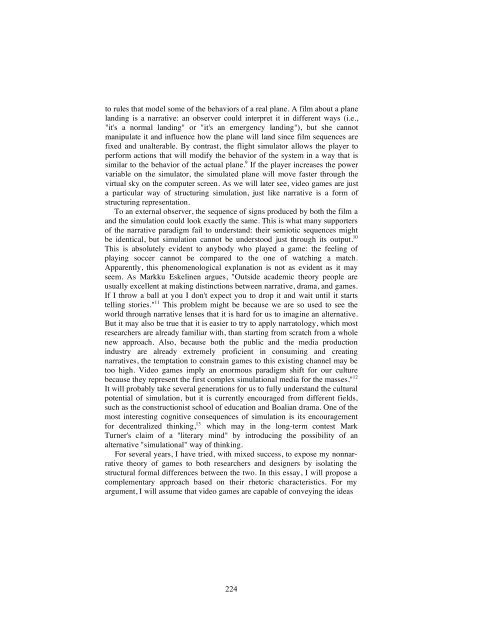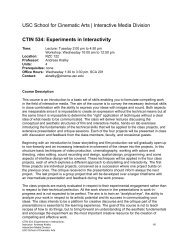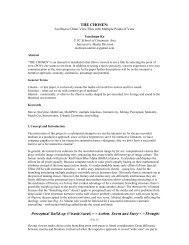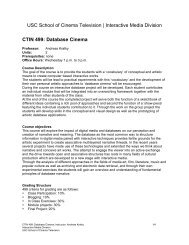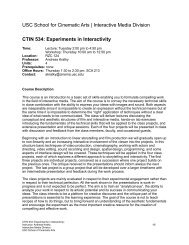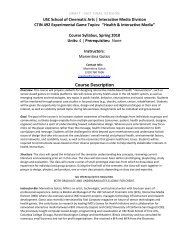Simulation versus Narrative - USC Interactive Media Division
Simulation versus Narrative - USC Interactive Media Division
Simulation versus Narrative - USC Interactive Media Division
- No tags were found...
You also want an ePaper? Increase the reach of your titles
YUMPU automatically turns print PDFs into web optimized ePapers that Google loves.
to rules that model some of the behaviors of a real plane. A film about a planelanding is a narrative: an observer could interpret it in different ways (i.e.,"it's a normal landing" or "it's an emergency landing"), but she cannotmanipulate it and influence how the plane will land since film sequences arefixed and unalterable. By contrast, the flight simulator allows the player toperform actions that will modify the behavior of the system in a way that issimilar to the behavior of the actual plane. 9 If the player increases the powervariable on the simulator, the simulated plane will move faster through thevirtual sky on the computer screen. As we will later see, video games are justa particular way of structuring simulation, just like narrative is a form ofstructuring representation.To an external observer, the sequence of signs produced by both the film aand the simulation could look exactly the same. This is what many supportersof the narrative paradigm fail to understand: their semiotic sequences mightbe identical, but simulation cannot be understood just through its output. 10This is absolutely evident to anybody who played a game: the feeling ofplaying soccer cannot be compared to the one of watching a match.Apparently, this phenomenological explanation is not as evident as it mayseem. As Markku Eskelinen argues, "Outside academic theory people areusually excellent at making distinctions between narrative, drama, and games.If I throw a ball at you I don't expect you to drop it and wait until it startstelling stories." 11 This problem might be because we are so used to see theworld through narrative lenses that it is hard for us to imagine an alternative.But it may also be true that it is easier to try to apply narratology, which mostresearchers are already familiar with, than starting from scratch from a wholenew approach. Also, because both the public and the media productionindustry are already extremely proficient in consuming and creatingnarratives, the temptation to constrain games to this existing channel may betoo high. Video games imply an enormous paradigm shift for our culturebecause they represent the first complex simulational media for the masses." 12It will probably take several generations for us to fully understand the culturalpotential of simulation, but it is currently encouraged from different fields,such as the constructionist school of education and Boalian drama. One of themost interesting cognitive consequences of simulation is its encouragementfor decentralized thinking, 13 which may in the long-term contest MarkTurner's claim of a "literary mind" by introducing the possibility of analternative "simulational" way of thinking.For several years, I have tried, with mixed success, to expose my nonnarrativetheory of games to both researchers and designers by isolating thestructural formal differences between the two. In this essay, I will propose acomplementary approach based on their rhetoric characteristics. For myargument, I will assume that video games are capable of conveying the ideas224


